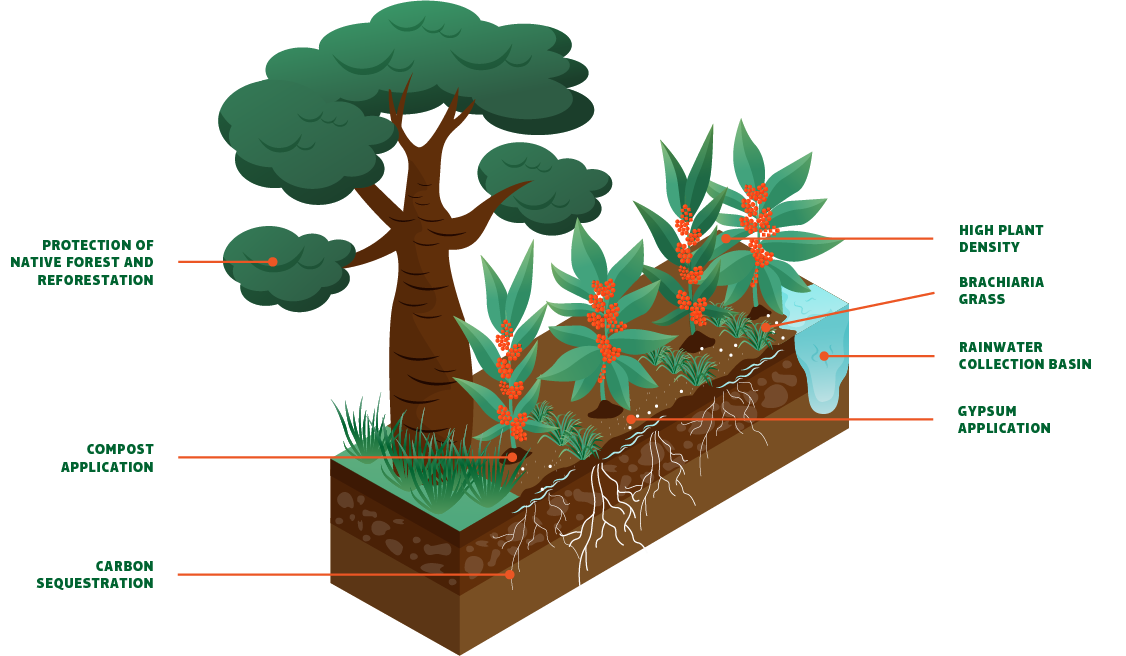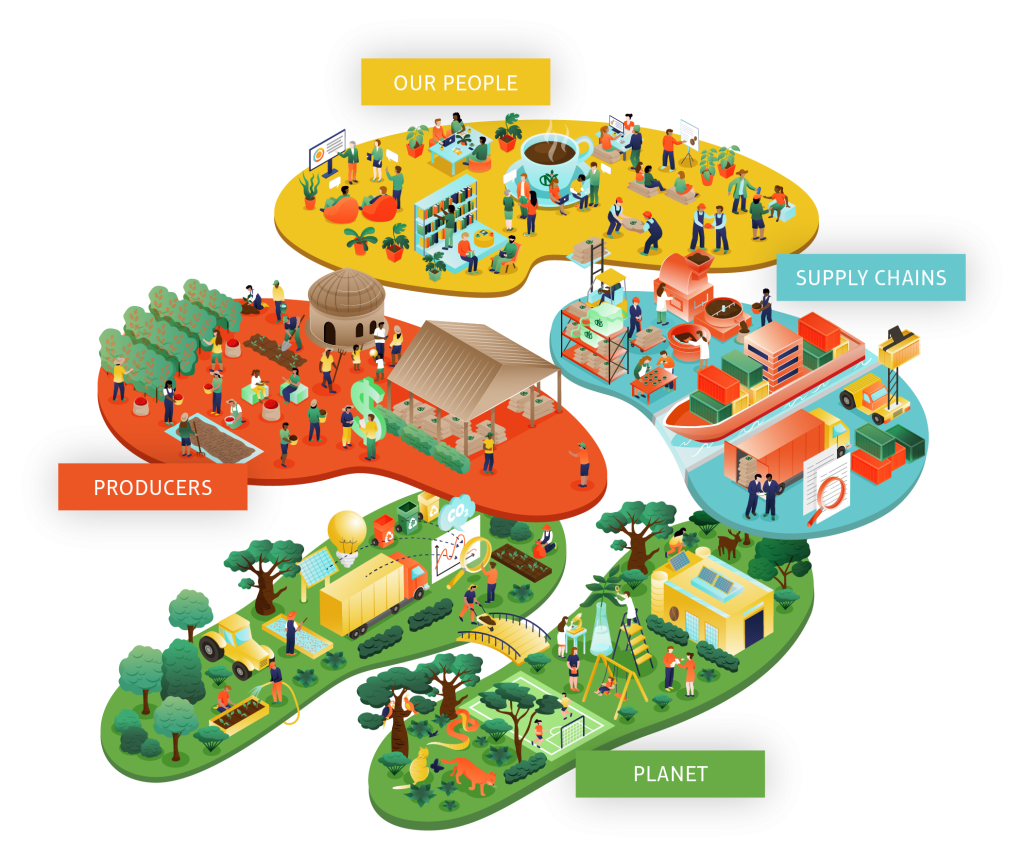Planet
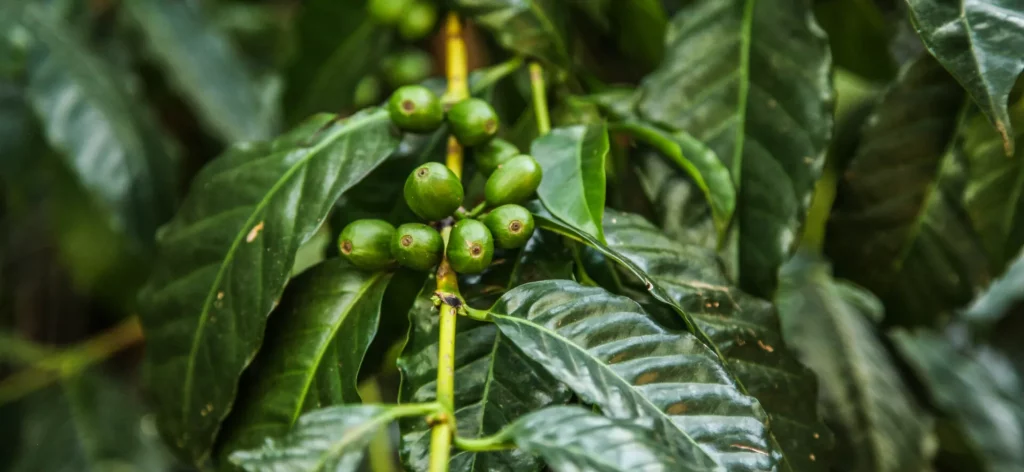
Promote environ- mentally friendly and resilient coffee farming practices
With increasingly uncertain weather patterns, environmentally friendly and resilient coffee farming has long become a key focus of our business.
Under Goal 9 of our Responsible Business Program we aim to run our own farm operations according to the latest sustainability standards. We believe that good agricultural practices are a major tool in fighting climate change and sustaining coffee production in the long run. For this reason, all our farms are guided by our “economically viable and responsible farming” philosophy. By taking responsibility for the natural and social environment, we want to be a model for other farming businesses and aim at sharing our knowledge with others as well.
Our NKG farms
NKG owns 5,100 hectares of responsibly managed Arabica and Robusta coffee plantations in three countries, building a prosperous, sustainable and diversified group of our own coffee farms. Finca la Puebla in Mexico was NKG’s first farming operation, later followed by Fazenda da Lagoa in Brazil and Kaweri Coffee Plantation in Uganda. All our farms have local teams of sustainability experts ensuring responsible farm management and long-term investment.

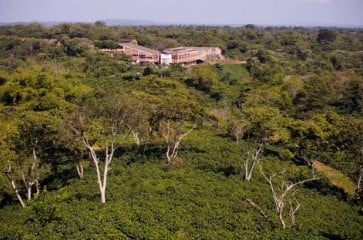
FINCA LA
PUEBLA
Location: Puebla, Mexico
Altitude: 600 m.a.s.l.
Production: 700-900 tons/year
Gross Area: 1,790 ha.
Planted Area: 910 ha. (coffee), 243 ha. (timber)
Permanent Employees: 69
Harvest time: October-March

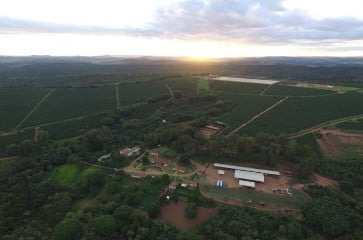
Fazenda da
Lagoa
Location: Minas Gerais, Brazil
Altitude: 1,100 m.a.s.l.
Production: 3,120 tons/year
Gross Area: 3,712 ha.
Planted Area: 1,687 ha.
Permanent Employees: 368
Harvest time: May-September

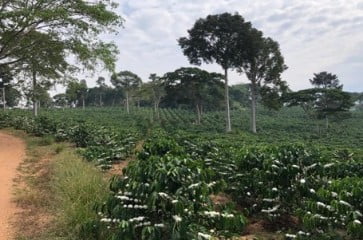
Kaweri Coffee Plantation
Location: Mubende, Uganda
Altitude: 1,300 m.a.s.l.
Production: 1,902 tons/year
Gross Area: 2,512 ha.
Planted Area: 1,626 ha.
Permanent Employees: 160
Harvest time: October-March and April-July
Good Agricultural Practices
In recent years, coffee farms worldwide have experienced more and more climate-related risks that can negatively impact coffee production and qualities. This also applies to our NKG farms. To adapt to these challenges and minimize adverse climate effects, we have developed and implemented a number of measures in the following areas:
- CARBON
- Biodiversity
- Water
- SOIL
In general, a large percentage of GHG emissions along the coffee supply chain is generated at farm level. As described under Goal 8, “Measure and enhance our environmental performance”, this is also the case for NKG farms. However, it is often dismissed that farms play an important role in carbon sequestration. Despite the emissions generated during coffee production activities such as the use of fertilizers and fossil fuels, the constant maintenance and care provided to the NKG coffee farms and the surrounding protected forests also have climatic benefits. Coffee production from sustainable agricultural practices allows the trees to grow in a healthy manner, which prevents emission generation due to land use change while increasing soil carbon as a natural climate solution. Since coffee farms work as natural carbon sinks storing CO2 in their above and below biomass, the overall process results in a positive CO2 net balance. On average, the three NKG coffee farms were responsible for sequestering 286 tons of below-ground carbon (CO2e) per hectare during 2021.
In addition to this natural process, NKG farms strive to reduce CO2 emissions wherever possible and economically viable. On the one hand, this means increasing energy efficiency in our operations, e.g., by using modern coffee drying infrastructure and machinery. On the other hand, we want to minimize our consumption of non-renewable energy, e. g., by installing photovoltaic systems at our mills. Even small steps like the composting of organic materials, and its reuse as natural instead of synthetic fertilizers, can help us to reduce our Corporate Carbon Footprint and to protect the environment.
Safeguarding and conserving biodiversity at our farms is one of our highest priorities. According to our principles of good agricultural practices, coffee cultivation should not compete with the local ecosystem but rather integrate into it. To this end, native forests and natural vegetation are protected on NKG farms to the greatest extent possible. Fazenda da Lagoa, for example, preserves 1,407 hectares of forest land and reforests an average of two hectares per year, using exclusively native trees.
In addition, bio-corridors and vegetated areas near rivers or streams (so-called “riparian buffers”) are being established at our farms to allow wildlife crossing and to protect aquatic ecosystems. In order to prevent negative interference with nature, such as the hunting of animals or chopping of trees, designated areas are partly under the full-time guard of our conservation rangers. Furthermore, farm workers, visitors and the surrounding communities are sensitized to the need to conserve nature in collaboration with local authorities.
While coffee cultivation and processing is highly dependent on water, rainfall patterns are becoming increasingly unpredictable in many coffee- growing regions. This requires farms to develop new strategies to manage their water use more efficiently and to increase their drought resilience.
At NKG farms, one of our focus areas is reducing water needs for washed coffee by implementing water recirculation systems. This includes the use of effluent from the wet mill to hydrate carbonized compost during the production stage.
To further support water availability at our farms, we supplement borehole water with harvested rainwater to supply the living quarters.
A similar approach can be found on our coffee fields. At Kaweri Coffee Plantation, we address water scarcity through the implementation of rainwater collection basins consisting of small in-field soil depressions. In this way, we reduce the run-off from the field and allow the rainwater to infiltrate the soil, so that it can be used by the plants.
In addition, both Kaweri Coffee Plantation and Fazenda da Lagoa rely on the use of so-called “jumbo plants.” Jumbo plants are seedlings grown in the nursery for 10 to 11 months. They have a stronger root system than the conventional six-month-old seedlings and can therefore grow faster in depth and find more water there. This is especially useful, since newly planted tress tend to be very sensitive to drought.
Another important tool is the application of gypsum. Gypsum is a very reactive soil conditioner consisting of calcium sulfate, which transports soil bases to deeper layers. Coffee roots follow these nutrients and reach much deeper layers where the soil holds more moisture.
To ensure soil fertility and prevent negative effects such as soil erosion, NKG farms rely on field management practices which are based on plant, soil and terrain necessity. This includes, for example, planting trees according to the topographic level of the coffee fields as well as regular soil and leaf analysis to optimize compost and fertilizer application.
Different soil cover techniques are used to maintain ground cover between coffee rows and thus reduce soil exposure. For this purpose, crop residues from the pruning process are left on the fields. Planting Brachiaria between coffee bushes also helps to prevent soil compaction and increase the water-holding capacity. After pruning, their branches cover the soil, protect it from direct sunlight, reduce water evaporation and serve as organic fertilizer.
Moreover, mature coffee fields are planted at high densities to protect the soil. High planting density leads to a total soil cover under the plants, which on the one hand eliminates the competitive weeds but also shields the soil from direct sunlight. The soil cooled in this way “sweats” less and soil moisture is retained better and longer.
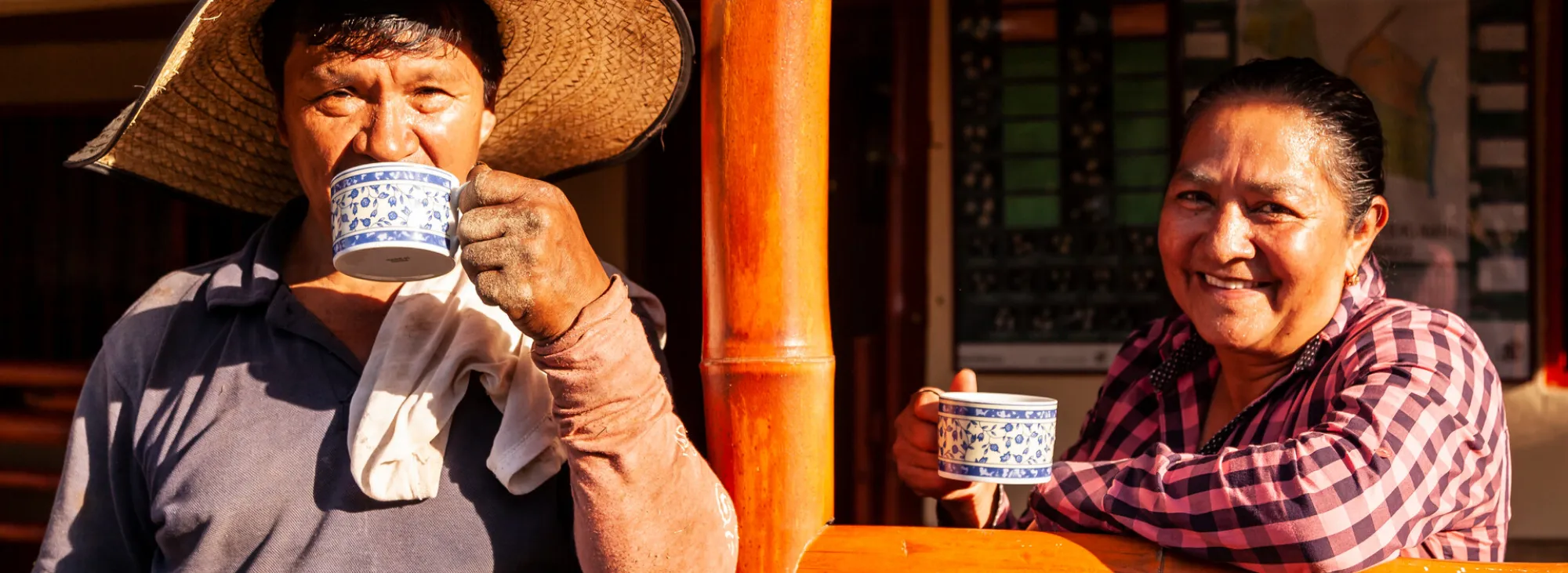
SOCIAL ENGAGEMENT
In addition to their environmental engagement, our farms also assume social responsibility as major employers in their municipalities. We are convinced that coffee farming can only be resilient if it creates value for everyone involved in the supply chain. For this reason, we want to create the best possible working environment for our workers and their families. This includes access to education and training, free social services such as housing, adequate sanitary facilities, warm meals, transportation, health care and medicine, as well as recreational activities, e.g., soccer fields and playgrounds.
All NKG farms also extend their environmental and social commitments beyond their own borders and into the surrounding communities. Support is given through basic infrastructure, such as drinking water supply and school renovations. There are a range of long-term projects underway, such as youth training programs, which provide social and entrepreneurial skills, agricultural, sports and cultural activities to young people. Our farm Finca La Puebla, for example, operates and finances the Youth Center in Santa Rita, where activities are run by an experienced social worker and psychologist.
Furthermore, all our farms foster a range of collaborations with local institutes, universities and interest groups, in order to share their know-how about field management and new production techniques and to enable research projects.
RELATED
sustainable
development
goals
